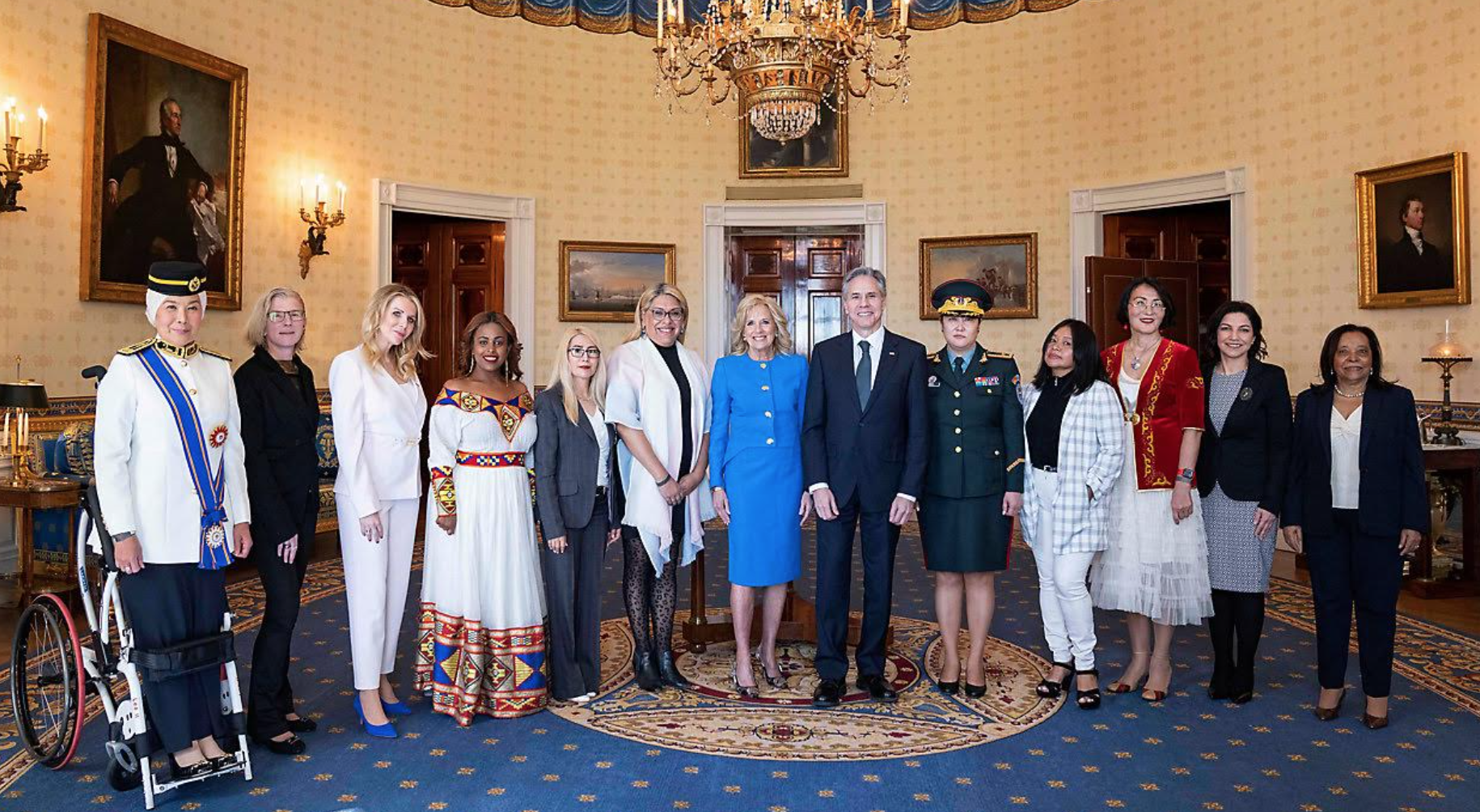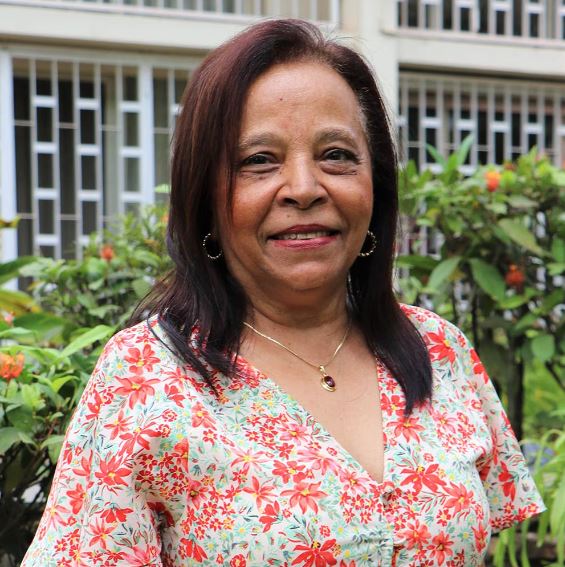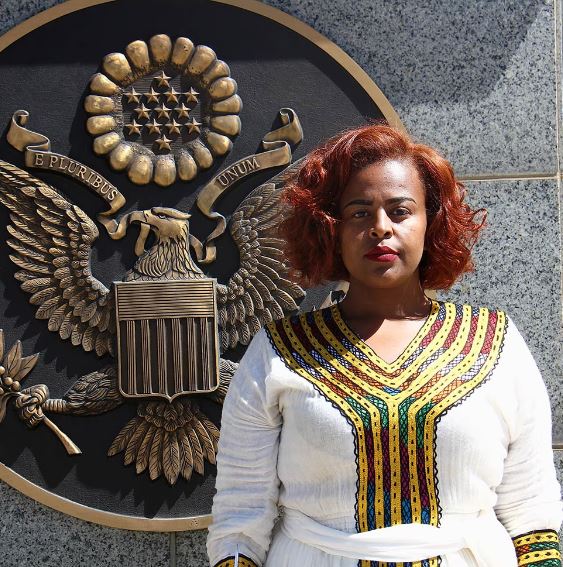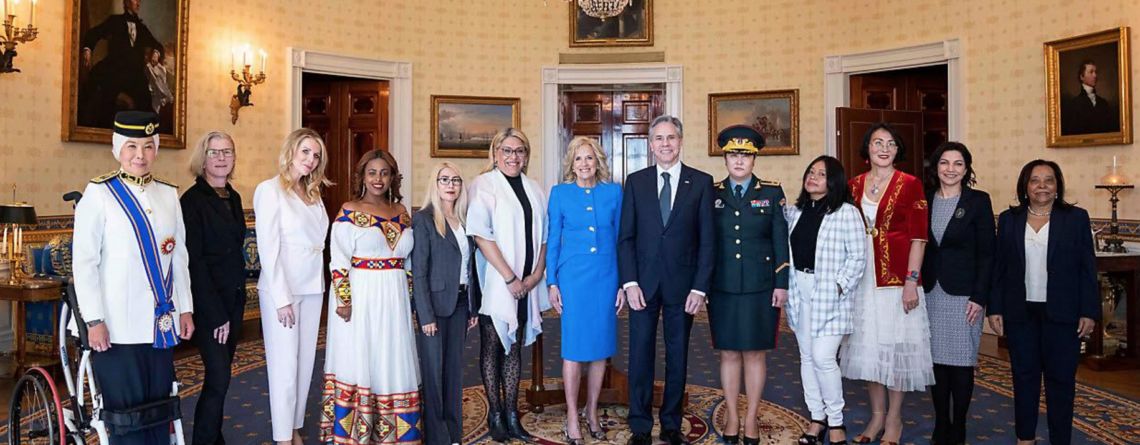Two Trailblazing African Women Honored By US First Lady Jill Biden. Who Are They?

By Pearl Matibe and Culton Scovia Nakamya
The United States First Lady, Dr. Jill Biden and the U.S. Department of State, Secretary of State, Antony Blinken hosted two of Africa’s women on March 8, 2023 International Women’s Day.
Although now in its 17th year, and often with a ceremony hosted at the State Department, this year, U.S. President Joseph Biden’s wife, the First Lady, Dr. Jill Biden and Secretary Blinken hosted the International Women of Courage (IWOC) Award Ceremony “from the White House for the first time in the award’s history,” the State Department said.
The annual IWOC Award recognizes women from around the globe who have demonstrated exceptional courage, strength, and leadership in advocating for peace, justice, human rights, gender equity and equality, often at great personal risk and sacrifice. Since 2007, the Department of State has recognized more than 180 women from over 80 countries.
Among this year’s 11 awardees are two African women Meaza Mohammed from Ethiopia and Professor Danièle Darlan from the Central African Republic.

Professor Danièle Darlan – Central African Republic, the former President of the Central African Republic’s Constitutional Court, has earned the title of an International Woman of Courage for her defense of her nation’s constitution, her heroism in safeguarding judicial independence, and her refusal to be influenced by threats or political pressure.
Her final act as President of the Court before her removal by the government, in which she found that methods proposed to redraft the constitution were not legally sound, exemplified her unwavering commitment to the rule of law. This courageous stand capped a lengthy and distinguished career as a lawyer, educator, judge, and advocate for institution building and women’s rights in one of the world’s poorest countries. Her tenacity has earned her the nickname “Woman of Iron” and a top spot on Jeune Afrique’s list of “The Thirty Building Tomorrow’s Africa.”

Meaza Mohammed – Ethiopia a veteran Ethiopian journalist, is the founder of Roha TV, an independent YouTube-based news and information channel. Such channels have become increasingly popular in Ethiopia, where broadcast media are almost entirely state-controlled. Her reporting has included coverage of the survivors of gender-based violence, including sexual violence. She has then worked directly with the victims to find treatment and other resources. On her platform, Mohammed has shared interviews with dozens of women who are victims of rape or otherwise sexually assaulted by armed militants during the northern conflict. She has been a strong voice advocating for investigation of and accountability for human rights violations during the conflict.
Mohammed’s vocal activism has not been without personal risk. She has been arrested repeatedly and charged with multiple counts, including allegedly spreading false rumors and disclosing the army’s battlefield location to the enemy. Despite her arrests, Mohammed remains committed to advocating for victims of gender-based violence and ensuring accountability for the crimes committed against them.
The Two Awardees opened up to Pearl Matibe about their victory.
Professor Danièle Darlan – Central African Republic
“I can say that in the Central African Republic we have the same problem to give you an image of the old legislature. We had 11 women out of 140 seated at the assembly. We tried to increase the number of women candidates. At the Constitutional Court, we do not have a quota of exact numbers as we do, but we do have a law on parity and that law stipulates that over 10 years we will not go directly to 50:50 parity, but at least 35% be women. So, the legislative elections were organized, and we promoted women candidates at the Constitutional Court. We put forth a lot of effort and we were able to have only 18 out of 140, which is a small improvement, but there’s still a lot of work to do.
The reasons why there is such low representation by women in politics in the Central African Republic is first of all the lack of resources. You need money to undertake a campaign. The second is in the mindset and the mentality. Very often even the husband of a potential candidate is opposed to his wife entering into politics and becoming visible. So, we have to work on those two fronts, resources and the mentality.
Now in response to your second question about early marriage, this is something that is virtually nonexistent in the capital because it’s more modern, but it is still a problem in the provinces and in villages. It’s continuing and this is long term work that has to be done, again, for a change of mentality. Because of the upheavals in our country, very often schools did not open at all. When the girls are at home, they get married. On this score, schooling for girls is extremely important.
Meaza Mohammed, Ethiopia:
Pearl Matibe: In Eswatini Meaza, women are ruled by the King [Mswati II], the last King on the continent of Africa [governed by a monarch]? You have received this award at the White House, do you have any inspirational message to young women and girls looking at you receiving this award? Prestigious at the White House, far away. Whereas they are in a rural village in Eswatini ruled by a King, what message do you have for them?
Meaza Mohammed: Well, I have a message for women that is helpful. You know, I am from Africa. So I have been trying to be a voice for the voiceless for different reasons, especially where there is ethnic-based attacks or identity-based attacks. So women and children are silent, but at least even with that weight, there is a time when the world can listen for us. It is a symbol that if you struggle, if you speak out in a courageous way, there is a place and there is a time that comes, that the world can listen to you. They will recognize what you’re speaking about. So I will not pretend. For all women and children out there, be courageous in order to start with being the voice for the voiceless.
Pearl Matibe: In Uganda, 50% of the population are women. So, half of all the people in Uganda are women. It’s not an unfair statement to say that women are marginalized. Can you speak, particularly, to girls who are married before they’re 15 or married before they’re 18?
Meaza Mohammed: Yeah, you know, it is also in my country, more than 50% of the population is women and decreasing women. Having a lot of courageous women in the society means we are educating and encouraging and having a courageous population at odds so people were really nervous and women were in this kind of situation, especially in early marriage and in different cultural situations. We have so many backward contract situations also in my country. I would like to see [women say] that it’s time for them to speak out about themselves. To escape from this situation. As you know, it’s very difficult. You’re not fighting against the academy. You’re not fighting against education or the politician. You’re fighting from the social psychology, even the social psychology that we have had enough space for women. Just women are entitled to be wise women but are just expected to be a good cook or for their husband. That’s what society expects from them and then it’s very hard even to escape from this. But there is a place in the world, that you know, which is ready to listen to them. There is a place in the international arena, which is expecting the woman to show them that they can stand up for themselves.
Pearl Matibe: And you are a journalist. Speak to women journalists on the continent, who are usually having a much tougher time than their male counterparts, but just speak specifically to women journalists, trying to do their work on the continent and the issue of press freedom.
Meaza Mohammed: Yeah, as I told you, in Ethiopia, just being a woman by itself is very difficult. And again, if you become a journalist, especially for speaking against the government, the [virtue of] speaking opposite to the government, brings out the trolls. It’s very difficult, not only for women, but for both men and women. But when it comes to a woman, the cultural situation, there is a socio-psychological issue there. And again, the dangerous politics of our country. Our continent [there is] so it’s tough, but whenever women are speaking, and are courageous enough to speak for the voiceless, then it’s very big. I would like to appreciate all women, in general, to come forward and speak on behalf of their sisters, to come forward and speak on behalf of other fellow women.
Pearl Matibe: Thank you so much for your time.


Comments (2)
Its a powerful news source,and the first story already pushes me to read more
It’s a very interesting time to ready your best articles